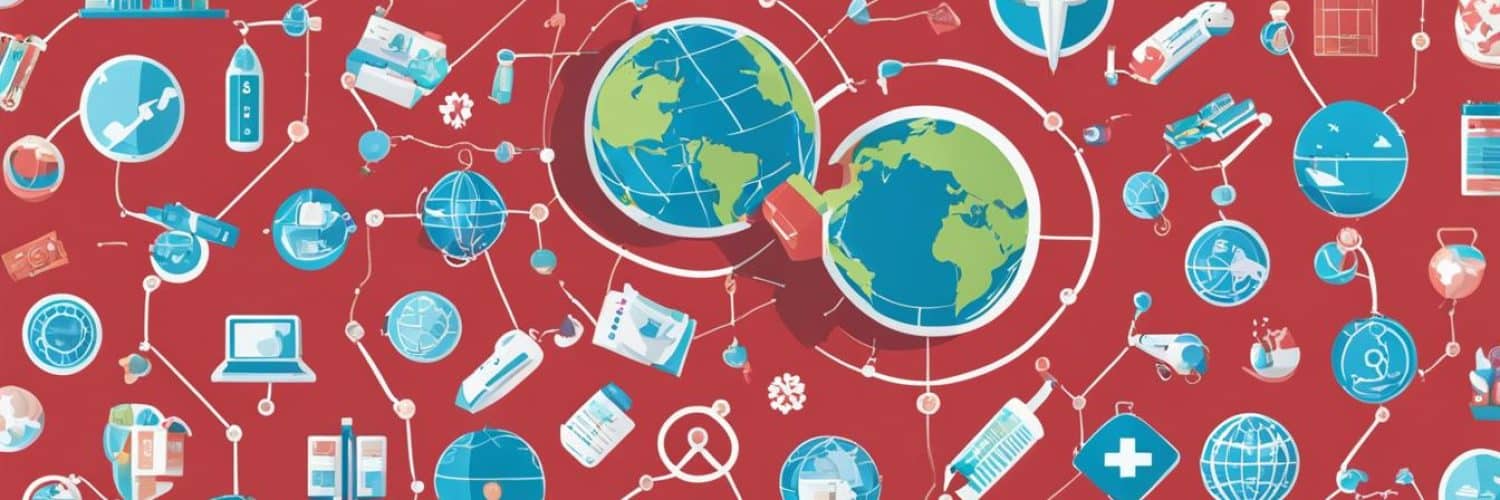Medical tourism has become a popular option for individuals seeking affordable healthcare abroad. Through medical travel, patients can not only receive high-quality medical care but also have the opportunity to explore new destinations. In this article, we will delve into real-life examples of medical tourism, highlighting the countries and procedures most commonly sought by medical tourists.
Key Takeaways:
- Medical tourism offers a chance to access affordable healthcare abroad.
- Popular medical tourism destinations include countries such as Thailand, Mexico, and India.
- The most sought-after procedures by medical tourists include cancer treatment, dental care, and fertility treatments.
- Before embarking on medical tourism, thorough research and preparation are essential.
- Communication challenges and potential risks should be taken into consideration for a safe and successful medical travel experience.
Categories of Medical Tourism
Medical tourism is a broad industry that can be categorized into two main categories: cosmetic tourism and non-cosmetic medical tourism. Each category offers distinct types of medical procedures and attracts different types of travelers seeking healthcare abroad.
Cosmetic Tourism
Cosmetic tourism involves traveling abroad for aesthetic surgeries and procedures aimed at enhancing one’s appearance. These procedures are typically elective and focus on improving physical aesthetics. Some common cosmetic procedures sought by medical tourists include:
- Abdominoplasty (tummy tuck)
- Breast augmentation
- Eyelid surgery (blepharoplasty)
- Liposuction
- Rhinoplasty (nose job)
Cosmetic tourism appeals to individuals who want to enhance their physical appearance while experiencing the benefits of traveling to a new destination.
Non-cosmetic Medical Tourism
Non-cosmetic medical tourism encompasses a wide range of medical procedures that are not primarily focused on aesthetics. These procedures are often medically necessary and include treatments for various conditions, diseases, and health concerns. Some examples of non-cosmetic medical procedures sought by medical tourists include:
- Cancer treatment
- Dental care
- Fertility treatments
- Physician-assisted suicide
- Rehab tourism for substance use disorders
- Transplant procedures
Non-cosmetic medical tourism caters to individuals who require specialized medical treatments or procedures that may be more affordable or accessible in a different country.
“Medical tourism offers a unique opportunity for individuals to access quality, affordable healthcare in countries around the world.” – Dr. Sarah Johnson, Medical Tourism Expert
Both categories of medical tourism have their own set of risks, considerations, and benefits. It is crucial for medical tourists to thoroughly research and understand the potential risks associated with their chosen procedure and destination.
| Category | Examples |
|---|---|
| Cosmetic Tourism | Abdominoplasty, Breast Augmentation, Eyelid Surgery, Liposuction, Rhinoplasty |
| Non-cosmetic Medical Tourism | Cancer Treatment, Dental Care, Fertility Treatments, Physician-assisted Suicide, Rehab Tourism, Transplant Procedures |
Medical Tourism Destinations and Rankings
The Medical Tourism Index (MTI) is a comprehensive ranking system that evaluates medical tourism destinations based on several key indicators. It provides valuable insights into the top medical tourism destinations across the globe. These destinations have established themselves as leaders in providing high-quality healthcare facilities and services for medical tourists.
Canada has consistently secured its position as one of the top medical tourism destinations. Renowned for its exceptional healthcare system, Canada offers a wide range of medical procedures, with a particular emphasis on orthopedic surgeries and complex heart procedures. Medical tourists benefit from the country’s cutting-edge medical technology and highly skilled healthcare professionals.
Singapore is another highly regarded medical tourism destination due to its excellent quality of healthcare facilities and services. The country offers a comprehensive range of medical treatments, with a strong focus on cosmetic procedures and oncology treatments. Singapore’s advanced medical infrastructure and highly trained medical professionals make it a popular choice among medical tourists seeking top-notch care.
The Medical Tourism Index also highlights other notable destinations that have made significant investments in their healthcare infrastructure, providing exceptional quality of healthcare facilities. These destinations include Japan, Spain, the United Kingdom, Dubai, Costa Rica, Israel, and Abu Dhabi.
Top Medical Tourism Destinations
| Rank | Country | Specialty Procedures |
|---|---|---|
| 1 | Canada | Orthopedic surgeries, complex heart procedures |
| 2 | Singapore | Cosmetic procedures, oncology treatments |
| 3 | Japan | Advanced medical technology, specialized surgeries |
| 4 | Spain | Organ transplants, fertility treatments |
| 5 | United Kingdom | Specialized medical expertise, cancer treatments |
| 6 | Dubai | Cosmetic surgeries, specialized healthcare centers |
| 7 | Costa Rica | Dental care, plastic surgeries |
| 8 | Israel | Advanced research facilities, specialized treatments |
| 9 | Abu Dhabi | State-of-the-art medical facilities, wide range of treatments |
Medical Tourism Risks and Complications
When considering medical tourism, it’s important to be aware of the risks and potential complications that can arise. Like any medical procedure, there are certain factors that can pose a threat to your health and safety.
Infection is one of the most common complications associated with medical tourism. In some countries, inadequate infection control practices can increase the risk of bloodborne infections, wound infections, and even infections transmitted from donors.
Antimicrobial resistance is another concern for medical tourists. Highly drug-resistant bacteria and fungi have been reported in certain medical tourism destinations. This means that the effectiveness of antibiotics and other antimicrobial drugs may be diminished, making it more challenging to treat infections.
Furthermore, the quality of care can vary from country to country. Differences in licensure requirements and adherence to infection control practices can impact the level of care provided. It’s essential to thoroughly research the medical facilities and clinicians you are considering to ensure they meet international standards of care.
To navigate these risks and complications, medical tourists should take the necessary precautions. This includes:
- Choosing accredited healthcare facilities that adhere to strict standards of quality and safety.
- Ensuring proper infection control practices are followed during the medical procedure.
- Being proactive in preventing infections by practicing good hygiene and following post-operative care instructions.
- Consulting with a healthcare provider before and after the procedure to address any concerns and ensure optimal care.
Taking these steps can help minimize the potential risks associated with medical tourism and ensure a safer, more positive experience.
| Risks | Complications |
|---|---|
| Infection | Increased risk of bloodborne infections, wound infections, and donor-derived infections |
| Antimicrobial Resistance | Presence of highly drug-resistant bacteria and fungi in some destinations |
| Quality of Care | Variations in licensure requirements and adherence to infection control practices |
Preparing for Medical Tourism
Before embarking on your medical tourism journey, it is important to take certain steps to ensure a smooth and successful experience. Here are some key factors to consider:
Pretravel Consultation
One of the first steps in preparing for medical tourism is to have a pretravel consultation with a healthcare provider or travel medicine clinician. This consultation is essential for assessing any specific risks or health considerations related to the procedure and travel. Your healthcare provider can provide valuable insights and recommendations to help you make informed decisions about your medical tourism journey.
International Travel Insurance
Obtaining international travel health insurance is crucial to protect yourself financially and medically during your medical tourism trip. Make sure your insurance covers medical expenses, including emergency medical evacuation back to your home country. This will provide you with peace of mind, knowing that you can receive the necessary medical care and be transported safely in case of any unexpected events.
Communication Challenges
When seeking medical care in a foreign country, communication challenges can arise, especially if there is a language barrier. To overcome these challenges, it is important to determine how communication will be facilitated with healthcare providers and make necessary arrangements beforehand. This may involve hiring a translator or interpreter, or ensuring that the healthcare facility has English-speaking staff who can assist you. Clear communication is crucial to ensure that you fully understand your medical treatment and can convey your needs and concerns effectively.
By taking these preparation steps, you can minimize potential risks and enhance your overall medical tourism experience.
Researching Facilities and Clinicians
When planning for medical tourism, it is crucial to research and evaluate the facilities and clinicians where the medical procedure will be performed. Conducting thorough research can help ensure that you receive quality care and have a positive medical tourism experience. Here are some key factors to consider:
Qualifications of Clinicians
Evaluating the qualifications of the clinicians who will be performing your procedure is vital. Look for information on their education, training, and experience in the specific medical procedure you require. Verify their credentials and check if they are board-certified or affiliated with reputable medical associations.
International Accreditation
A crucial aspect of researching medical facilities is to determine their accreditation status. International accreditation provides an assurance of quality and adherence to strict standards of medical care. Two prominent accrediting groups are Joint Commission International (JCI) and DNV GL International Accreditation for Hospitals, which maintain comprehensive lists of accredited healthcare facilities.
Accreditation ensures that medical facilities meet international standards of quality care and patient safety.
However, while accreditation is an important factor, it does not guarantee a positive outcome. It is essential to understand the potential risks associated with the specific procedure you are considering and make an informed decision based on thorough research.
Consider the reputation of the facility and read reviews or testimonials from previous patients. Look for any information on adverse events, malpractice cases, or patient complaints, although it’s important to remember that individual cases may not always reflect the overall quality of care provided.
Informed Decision-making
Researching medical facilities and clinicians is crucial to make an informed decision about your medical tourism journey. By evaluating the qualifications of clinicians and the accreditation status of the facility, you can ensure that you receive the appropriate level of care and minimize the risks involved.
Remember to consider all available information, assess the potential risks of the procedure, and consult with your healthcare provider before making a final decision.
| Factors to Consider | Important Information |
|---|---|
| Qualifications of clinicians | Educational background, training, experience, board certification |
| International Accreditation | Joint Commission International (JCI), DNV GL International Accreditation for Hospitals |
| Reputation and reviews | Patient testimonials, reviews, adverse events |
Maintaining Health and Medical Records
When embarking on a medical tourism journey, it is crucial for medical tourists to prioritize their health and ensure the smooth continuity of care. This section discusses the importance of maintaining health and medical records, packing a travel health kit, and making arrangements for follow-up care.
Carrying Copies of Medical Records
Medical tourists should carry copies of their medical records, including test results and relevant medical history. These records serve as a valuable source of information for healthcare providers at the destination, enabling them to gain a comprehensive understanding of the patient’s health background. This aids in delivering personalized and effective treatment throughout the medical tourism experience.
“Having access to medical records ensures that healthcare providers can make informed decisions and provide appropriate care during the medical travel journey,”
says Dr. Emily Sanchez, a renowned healthcare expert.
Packing a Travel Health Kit
A well-prepared travel health kit is an essential item for medical tourists. It should contain a sufficient supply of prescription and over-the-counter medicines, tailored to individual needs and in compliance with travel regulations. The kit should also include basic medical supplies such as bandages, antiseptics, and pain relievers.
Remember to consult with a healthcare provider or pharmacist before assembling the travel health kit. They can provide guidance on the specific medications and supplies that should be included based on the medical condition and the planned duration of the trip.
Making Arrangements for Follow-Up Care
Follow-up care is a crucial aspect of any medical procedure, and medical tourists should make appropriate arrangements before traveling. This ensures that post-procedure care can be received seamlessly in the patient’s home country, minimizing any potential complications or disruptions to the healing process.
It is advisable to schedule follow-up appointments with healthcare providers prior to embarking on the medical tourism journey. This allows for comprehensive evaluation, monitoring of the healing progress, and necessary adjustments to the treatment plan, if needed.
Essentials for a Travel Health Kit
| Item | Quantity |
|---|---|
| Pain relievers (e.g., acetaminophen, ibuprofen) | 2-3 bottles |
| Prescription medications | Sufficient supply for the trip |
| Antiseptic solutions (e.g., hydrogen peroxide) | 1 bottle |
| Bandages and adhesive strips | Multiple packs |
| Antihistamines | 1-2 boxes |
| Antidiarrheal medications | 1 box |
| Sunscreen (with appropriate SPF) | 1 bottle |
| Insect repellent | 1 bottle |
Remember to consult with a healthcare provider or pharmacist when preparing the travel health kit, as they can provide personalized advice and recommendations based on specific health needs and destination requirements.
By maintaining health and medical records, packing a well-stocked travel health kit, and arranging for follow-up care, medical tourists can prioritize their well-being and ensure a seamless medical tourism experience.
Potential Complications and Emergencies
Medical tourists should be aware of potential complications and emergencies that may arise during or after a medical procedure. While medical tourism can offer affordable and high-quality healthcare, it is important to understand the risks involved and be prepared for any unforeseen circumstances.
Risks and Complications
Infections: Infection is a common complication that can occur after a medical procedure, especially in countries where infection control practices may not be up to international standards. Medical tourists should ensure that proper hygiene protocols are followed and that facilities have strict infection control measures in place.
Bleeding: Bleeding is another potential complication that may occur during or after a procedure. It is crucial for medical tourists to seek immediate medical attention if they experience excessive bleeding.
Other Adverse Events: Adverse events such as adverse reactions to medications or anesthesia can also occur. Medical tourists should be vigilant and report any unusual symptoms or side effects to their healthcare provider.
Healthcare Insurance Coverage
Having comprehensive healthcare insurance that covers medical complications abroad is essential for medical tourists. It ensures that they are financially protected in case of any unexpected medical expenses. Medical tourists should review their insurance policy carefully to understand the extent of coverage and any exclusions related to medical tourism.
Emergency Care
Medical tourists should familiarize themselves with the local emergency care resources at their destination. This includes identifying nearby hospitals, clinics, and emergency contact numbers. Being prepared and knowing where to seek immediate medical attention can make a significant difference in the event of an emergency.
Being aware of potential complications and emergencies, having healthcare insurance coverage for medical complications abroad, and being prepared for any unforeseen circumstances can help ensure a safer and more successful medical tourism experience.
Success Stories in Medical Tourism
Medical tourism has been a life-changing experience for many individuals who have sought treatment abroad. Through accessing high-quality healthcare at affordable prices in other countries, these patients have achieved remarkable outcomes. Their success stories serve as a testament to the potential of medical tourism to transform lives and improve health outcomes.
One such success story is that of Sarah Thompson, who traveled to Thailand for a hip replacement surgery. Sarah had been suffering from chronic hip pain for years, and the cost of the procedure in her home country was prohibitively expensive. Through extensive research and consultation with her healthcare provider, Sarah found a renowned orthopedic surgeon in Thailand who specialized in minimally invasive hip replacements. The procedure was a success, and Sarah was able to regain her mobility and live pain-free.
Another inspiring example is the case of Miguel Rodriguez, who traveled from the United States to Mexico for dental implants. Miguel had been struggling with missing teeth, which affected his confidence and ability to eat properly. After researching multiple dental clinics in Mexico, Miguel chose a highly recommended facility that offered state-of-the-art technology and experienced dentists. The result was a beautifully restored smile and a newfound self-assurance.
The positive outcomes experienced by patients like Sarah and Miguel highlight the transformative power of medical tourism. By venturing beyond their borders, they were able to access specialized treatments and expert care that significantly improved their quality of life.
“Medical tourism allowed me to receive the surgery I desperately needed at a fraction of the cost. The experience was seamless, and the level of care I received was exceptional. I am forever grateful for the opportunity to regain my health.”
– Sarah Thompson
Key Benefits of Medical Tourism
There are several key benefits that medical tourists often experience:
- Access to world-class medical expertise
- Significant cost savings compared to domestic treatment
- Shorter waiting times for procedures
- Opportunity to combine medical treatment with a vacation
- Exposure to new cultures and experiences
It is important to note that every medical tourism case is unique, and thorough research and preparation are crucial for a positive experience. Patients should carefully consider their specific medical needs, consult with healthcare providers, and seek recommendations from trusted sources.
Future Trends in Medical Tourism
The field of medical tourism is constantly evolving, driven by emerging destinations and technological advancements. These factors are shaping the future of medical tourism, offering new opportunities and advancements for patients seeking affordable healthcare options and specialized treatments.
Emerging Medical Tourism Destinations
Several countries are gaining prominence as emerging medical tourism destinations due to their quality healthcare facilities and cost-effective treatments. The following destinations are becoming increasingly popular among medical tourists:
| Emerging Destinations | Highlights |
|---|---|
| Mexico | Affordable healthcare options, proximity to the United States |
| Brazil | Advanced medical facilities, renowned for cosmetic surgery |
| Turkey | Leading destination for hair transplant and cosmetic procedures |
These emerging destinations offer a wide range of medical treatments and procedures, attracting patients seeking high-quality care at accessible prices.
Technological Advancements
Technological advancements have had a significant impact on the future of medical tourism, enhancing patient experiences and outcomes. One notable advancement is telemedicine and telehealth, which allow medical tourists to access consultation and aftercare remotely. This technology eliminates the need for extensive travel and enables patients to receive follow-up care from the comfort of their homes.
Furthermore, innovative technologies such as robotics, artificial intelligence (AI), and virtual reality (VR) are revolutionizing surgical procedures, improving precision and minimizing invasiveness. These advancements enhance the overall quality and safety of medical treatments, attracting more individuals to consider medical tourism as a viable option.
“The future of medical tourism looks promising, with emerging destinations offering affordable healthcare and technological advancements transforming the patient experience.” – Dr. Emily Davis, Medical Tourism Expert
The combination of emerging destinations and technological advancements is paving the way for increased accessibility, improved healthcare outcomes, and enhanced patient satisfaction in the field of medical tourism. As more countries invest in their healthcare infrastructure and embrace technological innovations, the future of medical tourism holds tremendous potential for individuals seeking medical treatments abroad.
The Role of Accreditation in Medical Tourism
Accreditation plays a crucial role in ensuring the quality of care and patient safety in medical tourism. Healthcare facilities that have obtained international accreditation adhere to strict standards and guidelines, providing reassurance to medical tourists. Patients can have confidence in the capabilities and expertise of accredited facilities, as they have undergone rigorous assessments to meet international healthcare standards.
Accreditation also contributes to the overall reputation and trustworthiness of medical tourism destinations. When selecting a healthcare facility for medical tourism, it is essential to prioritize those with accreditation, as it signifies a commitment to quality and excellence in patient care. Accredited facilities adhere to stringent safety protocols, maintain high standards of cleanliness and infection control, and employ qualified healthcare professionals.
In addition, accreditation promotes continuous improvement in the quality of care provided by medical tourism facilities. By undergoing regular assessments and evaluations, accredited facilities strive to identify areas for improvement and implement necessary changes to enhance patient safety and satisfaction. This commitment to ongoing improvement ensures that medical tourists receive the highest standard of care throughout their medical journey.
For medical tourists, choosing an accredited healthcare facility not only ensures quality care and patient safety but also provides peace of mind during their medical travel experience. Accreditation serves as a benchmark for excellence and helps individuals make informed decisions when seeking healthcare services abroad.
Conclusion
Medical tourism offers a unique opportunity for individuals to access quality, affordable healthcare in countries around the world. The practice has gained popularity as people seek cost-effective alternatives and explore different destinations for their medical needs. However, it is crucial for medical tourists to be aware of the potential risks and complications associated with medical travel.
Thorough research and careful preparation are vital in ensuring a positive medical tourism experience. Patients should invest time in investigating medical facilities and the qualifications of the clinicians who will be performing their procedures. It is also important to consider the accreditation status of the chosen facilities to verify their commitment to high standards of care and patient safety.
Effective communication with healthcare providers is essential, particularly when seeking medical care in a foreign country. Understanding potential language barriers and making necessary arrangements beforehand can help ensure efficient and effective communication throughout the medical tourism journey.
By taking these necessary precautions and making informed decisions, medical tourism can provide life-changing medical treatments and a chance to explore new destinations. With proper planning, medical tourists can access quality healthcare, receive personalized attention, and enjoy a fulfilling experience that meets their unique needs.
FAQ
What is medical tourism?
Medical tourism refers to the practice of traveling internationally to receive medical care.
What are the categories of medical tourism?
Medical tourism can be categorized into cosmetic tourism and non-cosmetic medical tourism.
Which countries are popular destinations for medical tourism?
Popular destinations for medical tourism include countries such as Argentina, Brazil, Canada, Colombia, Costa Rica, Cuba, Dominican Republic, Ecuador, Germany, India, Malaysia, Mexico, Nicaragua, Peru, Singapore, and Thailand.
How are medical tourism destinations ranked?
The Medical Tourism Index (MTI) is a comprehensive ranking system that evaluates medical tourism destinations based on several key indicators.
What are the risks and complications associated with medical tourism?
Risks and complications of medical tourism include infection, antimicrobial resistance, and variations in the quality of care.
How can I prepare for medical tourism?
Preparing for medical tourism involves having a pretravel consultation, obtaining international travel insurance, and addressing communication challenges.
How can I research the facilities and clinicians for my medical procedure?
Researching medical facilities and clinicians involves checking qualifications and accreditation status.
What should I do to maintain my health and medical records during medical tourism?
It is important to carry copies of medical records and pack a travel health kit when undergoing medical tourism.
What should I do in case of complications or emergencies during or after a medical procedure abroad?
Are there any success stories in medical tourism?
Yes, there have been many successful medical tourism cases with positive outcomes and improved health.
What are the future trends in medical tourism?
The future of medical tourism holds the promise of emerging destinations and advancements in telemedicine and telehealth.
What is the role of accreditation in medical tourism?
Accreditation plays a crucial role in ensuring the quality of care and patient safety in medical tourism.







Add comment